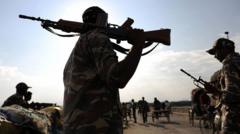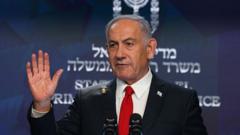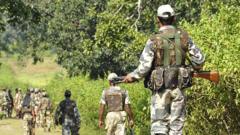The recent hijacking of a passenger train by the Baloch Liberation Army marks a significant shift in their tactics. This article delves into the background, motivations, and implications surrounding the Baloch separatist movement in Pakistan's Balochistan Province.**
The Growing Tensions of the Balochistan Separatist Movement: Recent Developments**

The Growing Tensions of the Balochistan Separatist Movement: Recent Developments**
A militant group in Pakistan has escalated its methods, notably through a train hijacking that has led to increased military action.**
The Balochistani separatist movement in Pakistan is witnessing a dramatic escalation in tactics, evidenced by a recent incident where separatist fighters seized a passenger train for approximately 36 hours in southwestern Pakistan. The hijacking was orchestrated by the Baloch Liberation Army (B.L.A.), which has increasingly targeted military, infrastructure, and foreign investments over the past few years, especially those associated with China. The Pakistani military swiftly intervened, declaring a successful rescue operation that freed the hostages and resulted in the deaths of more than 30 militants.
The Baloch Liberation Army is a renowned militant separatist group with a mission to establish an independent Baloch state. Their operations are part of a longstanding insurgency rooted in historical grievances related to political exclusion, economic deprivation, and military oppression faced by the Baloch people, an ethnic group inhabiting the region that includes parts of Pakistan, southeastern Iran, and southern Afghanistan.
The Baloch people boast a distinct culture and language, Balochi, which ties them to the Iranian language family. Their history is characterized by a seminomadic lifestyle and a tradition that values autonomy. Many Baloch nationalists believe that their region has been persistently marginalized by national authorities, leading to a deep-seated resentment and the current push for independence.
Quetta, the capital of Balochistan, serves as a focal point in the ongoing conflict due to its strategic significance near the Afghan border, which makes it vital for trade and security operations. Although Balochistan is the largest province in Pakistan by land area—comprising approximately 44 percent of the country—it is the least populated, hosting only about six to seven percent of Pakistan’s total population. As tensions continue to rise, the implications for both the Baloch people and the broader geopolitical landscape remain uncertain.
The Baloch Liberation Army is a renowned militant separatist group with a mission to establish an independent Baloch state. Their operations are part of a longstanding insurgency rooted in historical grievances related to political exclusion, economic deprivation, and military oppression faced by the Baloch people, an ethnic group inhabiting the region that includes parts of Pakistan, southeastern Iran, and southern Afghanistan.
The Baloch people boast a distinct culture and language, Balochi, which ties them to the Iranian language family. Their history is characterized by a seminomadic lifestyle and a tradition that values autonomy. Many Baloch nationalists believe that their region has been persistently marginalized by national authorities, leading to a deep-seated resentment and the current push for independence.
Quetta, the capital of Balochistan, serves as a focal point in the ongoing conflict due to its strategic significance near the Afghan border, which makes it vital for trade and security operations. Although Balochistan is the largest province in Pakistan by land area—comprising approximately 44 percent of the country—it is the least populated, hosting only about six to seven percent of Pakistan’s total population. As tensions continue to rise, the implications for both the Baloch people and the broader geopolitical landscape remain uncertain.




















